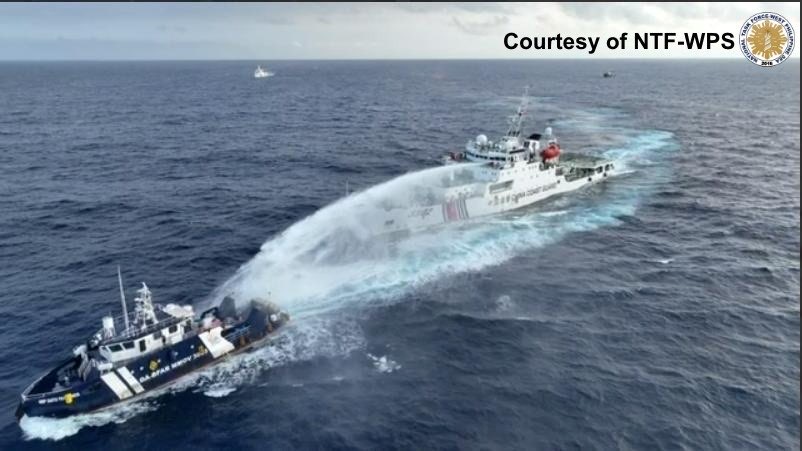US, other nations raise concern over China's actions in West PH Sea

Several embassies in Manila expressed concern over China's recent aggressive acts on Wednesday after a Philippine civilian vessel was rammed and water cannoned in the vicinity of Bajo de Masinloc (Scarborough Shoal) in the West Philippine Sea.
In a post on X, United States Ambassador to the Philippines MaryKay Carlson said, "The PRC's unlawful use of water cannons and dangerous maneuvers disrupted a Philippine maritime operation on December 4, putting lives at risk."
Carlson said America condemns such actions, assuring that it stands with its allies the Indo-Pacific region.
The PRC's unlawful use of water cannons and dangerous maneuvers disrupted a Philippine maritime operation on December 4, putting lives at risk. We condemn these actions and stand with our likeminded #FriendsPartnersAllies in support of a #FreeAndOpenIndoPacific.
— Ambassador MaryKay L. Carlson (@USAmbPH) December 4, 2024
In the face of China's increasingly aggressive posture in recent years, the United States has repeated assured that its commitment to the Philippines, one of its closest allies in Southeast Asia, remained "ironclad."
Manila and Washington are bound by the 1951 Mutual Defense Treaty (MDT), which can be invoked in case of armed attacks on Philippine forces, public vessels, or aircraft in the South China Sea.
Meanwhile, the European Union (EU) said it was "very concerned" over China's recent acts, saying these violated the United Nations Convention on the Law of the Sea (UNCLOS).
"Very concerned by China's aggressive actions against Philippine government vessels near Scarborough Shoal and Sabina Shoal on 4 December," EU Ambassador to the Philippines Massimo Santoro said in a post on X (formerly Twitter).
"Such behaviour clearly runs counter the UNCLOS and international maritime safety regulations," he added.
Very concerned by China’s aggressive actions against ???????? government vessels near Scarborough Shoal and Sabina Shoal on 4 December. Such behaviour clearly runs counter the UNCLOS and international maritime safety regulations.
— EU Ambassador to the PH ???????????????? (@EUAmbPH) December 4, 2024
Last September, the EU condemned "dangerous actions" by China Coast Guard vessels against "lawful" Philippine maritime operations. Beijing, however, urged the EU to be "objective and fair" and careful with words and actions on South China Sea issues.
New Zealand, which has participated in joint maritime drills in the West Philippine Sea, said the China's actions and presence of the latter's People's Liberation Army Navy (PLAN) ships during the incident were "deeply worrying."
"These latest dangerous actions by the Chinese Coast Guard towards the Philippines are deeply worrying, as is the presence of PLAN vessels. Water cannons and contact between vessels risk safety at sea and threaten regional stability and international law," the New Zealand Embassy in Manila said.
"We again firmly call for peaceful resolution of disputes in accordance with UNCLOS," it added.
These latest dangerous actions by the Chinese Coast Guard towards the Philippines are deeply worrying, as is the presence of PLAN vessels. Water cannons and contact between vessels risk safety at sea and threaten regional stability and international law. 1/2 https://t.co/6Kunh2InFI pic.twitter.com/1hvG8SaLVv
— New Zealand Embassy in Manila (@NZinManila) December 4, 2024
Earlier in the day, the Philippines accused China of sending its Navy ships to shadow vessels in the Bajo de Masinloc, saying these "participated in the blocking or aggressive movements" of Chinese coast guard ships.
Finland, a member of the European Union, also voiced concern about China's actions on Wednesday.
"Expressing my concern about these dangerous maneuvers and call for respect for international law," Finland Ambassador Saija Nurimen said in a post on X.
???????? Ambassador Nurminen: Expressing my concern about these dangerous maneuvers and call for respect for international law. https://t.co/c1lHG0A2Mg
— Finland in the Philippines (@FinlandinPH) December 4, 2024
According to Philippine authorities, the Chinese Coast Guard on Wednesday launched water cannon attacks and performed dangerous maneuvers, including side swiping, blocking, and shadowing.
They also accused China of sending Navy ships to shadow vessels at Bajo de Masinloc, noting that it was the first time PLA Navy vessels "came quite near and participated in the blocking or aggressive movements of the Chinese vessels."
For its part, the Chinese Embassy in Manila warned the Philippines to "immediately halt its infringements, provocations and inflammatory actions" and claimed that Philippine vessels intentionally rammed into a CCG ship.
"The Philippines will be held accountable for all consequences arising from this," CCG spokesperson Liu Dejun said.
Beijing claims almost all of the South China Sea, a conduit for more than $3 trillion of annual shipborne commerce, including parts claimed by the Philippines, Vietnam, Indonesia, Malaysia, and Brunei.
In 2016, an international arbitration tribunal in Hague ruled in favor of the Philippines over China's claims in the South China Sea, saying that it had "no legal basis."
China has not recognized the decision. — VDV, GMA Integrated News




